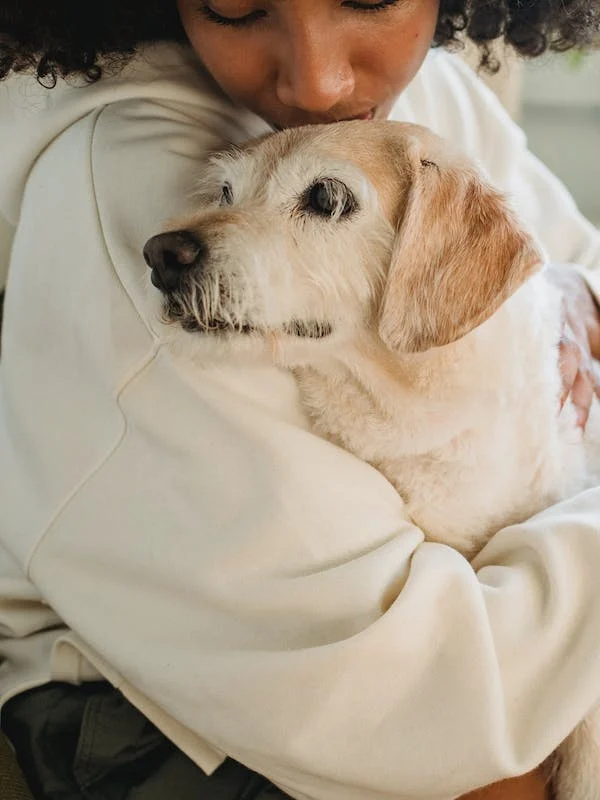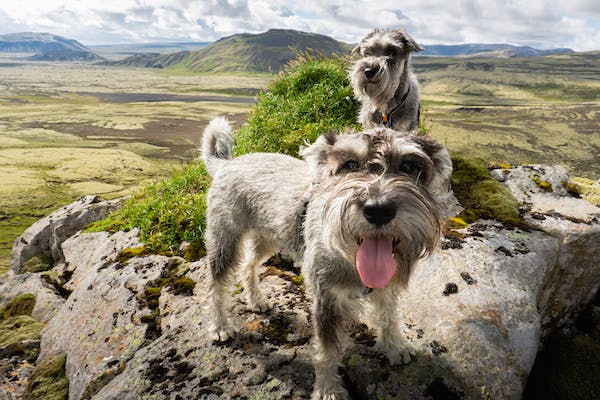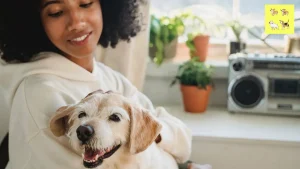Dogs are known for their loyalty, affection, and playfulness. It’s no surprise that pet owners love to shower their furry friends with love and affection. But, do dogs enjoy receiving kisses on the head?
Understanding how dogs perceive affection is critical to answering this question.
Dogs use body language and vocalisations to communicate, and they perceive affection differently than humans.
While people like receiving hugs and kisses, dogs may find them dangerous or uncomfortable.
Key Takeaway
- Dogs perceive affection differently than humans and communicate through body language and vocalizations.
- Dogs may react differently to kisses on the head depending on their personality, past experiences, and relationship with their owner.
- Pet owners should understand their dog’s body language and interpret their reactions when showing affection.
Dogs may react differently to kisses on the head based on their personality, previous experiences, and bond with their owner.
Some dogs may love the attention and affection, while others may become uneasy or agitated as a result. Pet owners must learn their dog’s body language and interpret their reactions when they exhibit affection.
- Do Dogs Like When You Scratch Their Sweet Spot
- Black Lab Golden Retriever Mix in 2023: Characteristics, Care Tips
- Best Dog Stroller Under $50 In 2023: Affordable and Convenient
Understanding Dogs’ Affection Perception
Canine Interaction
Body language, vocalisations, and odours are all ways dogs communicate. They have a unique style of displaying affection that may differ from that of humans.
A dog licking or nuzzling a person is a gesture of affection. Dogs, on the other hand, may not comprehend the concept of kissing on the head as a gesture of affection.

Dogs communicate via their tails, ears, and body posture as well. A wagging tail may represent enjoyment, but a tucked tail may represent fear or anxiety.
A relaxed body posture can also convey contentment, whereas a stiff posture can imply hostility or discomfort.
Personal Space Perception in Dogs
Dogs’ perceptions of personal space may differ from those of humans. While some dogs appreciate being held or kissed on the head, others may find it distressing or even dangerous.
It is critical to respect a dog’s personal space and refrain from demanding unwanted attention.
Furthermore, dogs’ preferences for physical touch may differ. Some dogs like belly rubs, while others like scratches behind the ears. It is critical to read a dog’s body language and respond appropriately.
Understanding a dog’s perception of affection is critical for developing a deep link between a canine and its owner.
Dogs communicate using body language, vocalisations, and odours, and they have different preferences for physical contact.
It is critical to respect a dog’s personal space and to cater to its unique wants and preferences.
Do Dogs Like Kisses on the Head?
Many people enjoy giving their dogs a peck on the head as a way of showing affection to them. However, the issue remains: do dogs genuinely enjoy head kisses?
Dogs may not comprehend what kisses mean, but they can learn to accept them as a form of affection from their owners, according to Reader’s Digest.
If a dog has been trained to take kisses on the head, they will most likely appreciate them. If a dog has never been kissed before, he or she may not comprehend what is going on and may respond badly.
It’s vital to realise that not all dogs love having their heads kissed. According to Daily Paws, if a dog has not been educated to accept kisses, he or she may not appreciate the gesture.
In reality, if a dog feels threatened or uncomfortable, he or she may react with fear or hostility.
Finally, whether or not a dog enjoys head kisses is determined by the individual dog and their own preferences.
Some dogs may welcome the attention and affection, while others may dislike being kissed. As with any encounter with a dog, paying attention to their body language and behaviour is essential to ensuring that they are comfortable and happy.
Interpret Your Dog’s Reaction
Many people lean in for a kiss on the head when it comes to giving affection to a dog. However, not all dogs appreciate this type of affection.
Understanding your dog’s reaction to a head kiss is critical for establishing a strong bond with your canine companion.
Positive Signs
Some dogs may respond positively to a kiss on the head. Among these indicators are:
- Tail wagging
- Licking their lips
- Soft, relaxed body language
- Snuggling closer to their owner
If your dog displays any of these behaviors after receiving a kiss on the head, it is likely that they enjoy this form of affection.
Negative Signs
On the other hand, some dogs may show negative signs when receiving a kiss on the head. These signs include:
- Pulling away or avoiding contact
- Stiff body language
- Growling or showing teeth
- Flattening their ears
If your dog exhibits any of these behaviours after receiving a kiss on the head, you should avoid this type of contact in the future.
It is critical to respect your dog’s boundaries and discover other ways for them to express affection.
Finally, analysing your dog’s reaction to a head kiss is critical for keeping a great bond with your furry pet.
You may tell whether they like this type of affection by observing their body language and behaviour.
Best Practices When Showing Affection to Dogs
It’s vital to remember that not all dogs prefer the same things when it comes to giving affection to them. While some dogs appreciate being kissed on the head, others may feel threatened by such demonstrations of affection.
It’s critical to follow some best practises to ensure that you’re offering your dog the appropriate amount of affection.
Respecting Your Dog’s Boundaries
When displaying affection to dogs, one of the most important things to remember is to respect their boundaries.
Dogs, like humans, have personal space and comfort zones. If a dog objects to being kissed on the head, it’s crucial to respect that and find alternative ways to express affection.
It’s also vital to observe a dog’s body language. Growling, flashing teeth, or pulling away are signs that a dog is uncomfortable with affection.
If your dog exhibits any of these behaviours, you should stop providing affection and give him some space.
Alternative Ways to Show Affection
If a dog does not like being kissed on the head, there are numerous other methods to express affection.
Physical touch, such as petting or scratching behind the ears, is one of the best methods to demonstrate affection to a dog.
Dogs like spending time with their owners as well, so taking them for a walk or playing with them can be a terrific way to express affection.
Positive reinforcement is another approach to demonstrate affection to dogs. When they display good behaviour, you can reward them with goodies or vocal praise.
Positive reinforcement can assist build a dog’s bond with its owner while also improving the dog’s behaviour.
Overall, when it comes to displaying affection to dogs, it’s crucial to respect their boundaries and, if necessary, find alternative ways to demonstrate affection.
Owners may ensure that they are offering their pets the appropriate amount of affection while also building their bond by following these best practises.
Conclusion
Finally, whether or not dogs appreciate head kisses is a point of contention among pet specialists. Some experts believe that kissing is a sign of dominance or aggression in dogs, whilst others believe that dogs love physical affection and attention.
It is critical to recognise that each dog has its own personality and interests, and what one dog enjoys may not be enjoyed by another.
As a result, when giving affection, including kisses, dog owners must pay close attention to their dog’s body language and behaviour.
Turning away, licking their lips, yawning, or snarling are all signals that a dog does not like kisses on the head. Some dogs, on the other hand, may aggressively seek kisses and tactile attention from their owners.
It is ultimately up to each dog owner to judge whether or not their dog enjoys head kisses.
Dog owners may provide the utmost care and devotion for their furry friends by paying attention to their dog’s behaviour and preferences.
Frequently Asked Questions Related To Do Dogs Like Kisses on the Head
Do dogs like being kissed on the head?
Dogs appreciate being kissed on the head, but it all comes down to the particular dog and their preferences. Some dogs may like the affection and attention, whilst others may find it unsettling or even unpleasant. It is critical to observe your dog’s body language and behaviour to establish whether or not they are enjoying the attention.
Why do dogs like being kissed on the head?
Dogs may love being kissed on the head since it shows their owner’s physical affection and attention. Dogs are gregarious animals who desire human attention and affection. Furthermore, because dogs have smell glands on their heads, getting kissed on the head may be a means for them to leave their fragrance on their owner.
Where do dogs like to be kissed?
This question has a different response for each dog. Some dogs appreciate having their heads kissed, while others prefer to have their faces or chins kissed. It is critical to observe your dog’s body language and behaviour to know where they prefer to be kissed.
Is it okay to kiss your dog on the head?
Kissing your dog on the head is normally safe, but you should be conscious of your dog’s preferences and body language. Some dogs may become uncomfortable or stressed as a result of the attention. Furthermore, it is critical to practise excellent hygiene and refrain from kissing your dog if you are sick or have open sores in your lips.
Do dogs understand when you kiss their head?
Dogs may not understand the notion of kissing, but they do recognise the affection and attention that it brings. Dogs are extremely sensitive to their owners’ emotions and behaviour, and they can detect the love and affection that comes with a kiss on the head.
Do dogs like being pet?
Most dogs appreciate being pet, but it is vital to observe their body language and behaviour to assess whether or not they are enjoying the attention. Some dogs love to be petted in specific regions, such as their back or tummy, while others do not. When it comes to physical affection, it’s critical to respect your dog’s preferences and boundaries.




